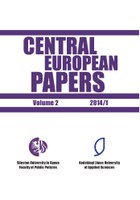Non-Participative Political Culture in Hungary – Why are the Particpatory Pillars of Democratic Political Culture Weak in Hungary?
Non-Participative Political Culture in Hungary – Why are the Particpatory Pillars of Democratic Political Culture Weak in Hungary?
Author(s): János SimonSubject(s): Politics / Political Sciences
Published by: Slezská univerzita v Opavě, Fakulta veřejných politik
Keywords: Political culture; citizen’s behavior; voting preference; political participation; electoral campaign; well-fare state; authoritarian system; democracy; civil society
Summary/Abstract: In the study we analyzed the pillar-building process of democratic political culture on a mass level. In the first part we described the history of “broken” (“mangled”) civil society during the authoritarian regimes (1949–1989). Then we analyzed the “reconstruction” of civil society in the new democracy (1990–2010). In the second part we analyzed our time series surveys (1989 to 2010). We documented a low level of political participation and social trust in politics, and low interest in the involvement in politics. The main findings support the view that the reconstruction process of civil society occurred through irregular, cyclic changes in which strengthening mixed with weakening. The changes led to a formation of civil society of greater extensity, but relatively low intensity. The further development of civic culture in Hungary will require more time.
Journal: Central European Papers
- Issue Year: 2/2014
- Issue No: 1
- Page Range: 167-188
- Page Count: 22
- Language: English

